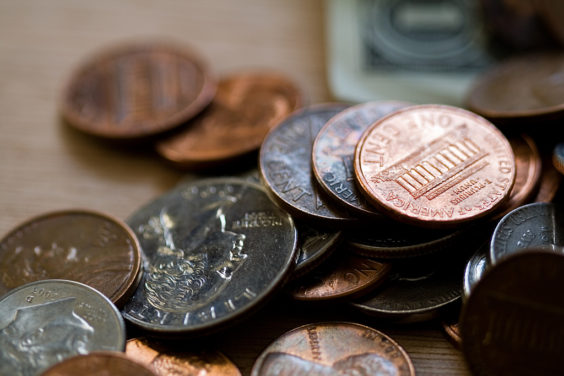
If you’re saving up your pennies to buy the perfect holiday gift – be careful. Your local store may not take them.
Portland, Oregon-based Fred Meyer found itself in the middle of a social media firestorm over the past 24 hours, after its Facebook fans reacted angrily to the story that a suburban Seattle woman shared last night:
“My daughter had been saving every coin she could find to buy her friend a gift card for a 3 month membership to their online game,” she wrote on Fred Meyer’s Facebook page. She continued,
“Today was the big day we were going to buy the present at a Fred Meyer grocery story, owned by Kroger. We walked up to Customer Service and stepped aside so we could put the coins (mostly quarters) into $1 piles so it would be less hassle for the cashier…
The floor manager walked up and told us that they do not cash in coins and we would have to use the Coinstar. I explained that we were not cashing them in, but buying something. I went on to explain that my daughter is 9 years old and if she used the Coinstar, she would lose 8% of her money and not have enough for her present. The woman looked at my daughter, who had started to cry, and told us to go to a bank. We were not allowed to use our coins.”
She went on to say that Safeway gladly took her daughter’s money. “Please,” she concluded, “spread this story around the country.”
The story certainly spread among Fred Meyer shoppers. Hundreds of them took Fred Meyer to task on its Facebook page. “This is just wrong in every way. What a horrible way to treat a customer,” wrote one. “Money is money, sounds like this cashier and manager were just too lazy or not smart enough to count coins,” said another. “True holiday spirit, right?” wrote a third.
Fred Meyer responded via Facebook the next morning: “We want to be VERY clear that our policy is to accept both cash and coins for payment. Money at Fred Meyer, is money, and it sounds like the cashier and manager are confused about the policy.”
Hours later, the original poster reported that the situation had been resolved: “We received a very nice apology from the store director and a gift card that was not asked for or expected… Thank you to the Fred Meyer and Kroger Corporations for their prompt response and care for our situation.”
Customer complaints turned to kudos for Fred Meyer, for its quick response to what many pointed out was just an isolated incident. But the thing is, this isn’t the first time something like this has happened at Fred Meyer.
Just last year, a woman in Portland, Oregon said a Fred Meyer there refused to allow her to pay for groceries with change. “We had nothing to feed our children with,” she told KATU-TV. “So we broke out the change.” She said the store wouldn’t accept her $32 in quarters, nor would the Save-a-Lot that she tried as well.
“Receiving change for a payment is a rare occurrence,” a Fred Meyer spokesperson offered in response. “Fred Meyer stores do accept change as payment and we will work with our store directors and management teams to ensure they know this.” Save-A-Lot issued a similar statement. Other grocery stores that KATU-TV contacted, however, offered seemingly arbitrary rules – Albertsons said they would only accept $5 in change, QFC would accept “$5 or $6”, and WinCo and Safeway didn’t name a limit, but said they do tell some customers to use the Coinstar machine.
In truth, there’s nothing compelling any retailer to accept loose change – other than potential bad press. The U.S. Treasury explains, “There is… no Federal statute mandating that a private business, a person or an organization must accept currency or coins as payment for goods and/or services. Private businesses are free to develop their own policies on whether or not to accept cash unless there is a state law which says otherwise.”
Fred Meyer insists it does accept any form of currency, and said it “sent an alert to ALL stores company-wide today reminding them that our policy is to accept coins.” The store did not immediately respond to a request for comment on this incident, or to share the precise wording of its store policy on coin acceptance.
But for now, it’s public relations disaster averted – at least until the next time it happens and someone takes their story to the local news station, or to Facebook. As customers await a response from Dollar Tree about its own recent public relations disaster (read: “Dollar Tree: Silence Speaks Volumes?”), perhaps Fred Meyer’s effort to make this situation right is a lesson from which others can learn.










